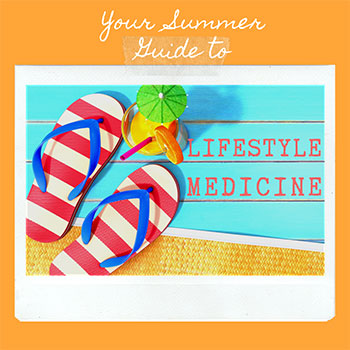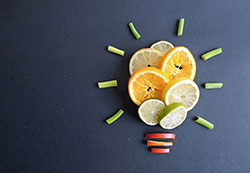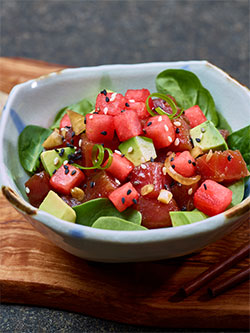Lifestyle Medicine is a new buzz word in the world of health and wellness, and while the term might be new, the principles of Lifestyle Medicine are things nutrition and wellness experts have been preaching for years. According to the American College of Lifestyle Medicine, Lifestyle Medicine is the use of evidence-based lifestyle therapeutic approaches, such as a plant-predominant dietary lifestyle, regular physical activity, adequate sleep, stress management, avoiding the use of risking substances and pursuing other non-drug modalities, to treat, and prevent chronic disease. This month I’m sharing why the summer is the perfect opportunity to embrace Lifestyle Medicine and how you can incorporate these principles into your day to day routine! With Lifestyle Medicine, you’re empowered to take charge of your own health.
-Stephanie |
|
|
Summer Guide to Lifestyle Medicine
|
 Why wait till September or January to start thinking about changing your nutrition and health habits, when you can start today? The summer is actually the perfect opportunity to embrace Lifestyle Medicine and start implementing new habits. Listed below are some easy things you can start doing today to reap the health and wellness benefits. Why wait till September or January to start thinking about changing your nutrition and health habits, when you can start today? The summer is actually the perfect opportunity to embrace Lifestyle Medicine and start implementing new habits. Listed below are some easy things you can start doing today to reap the health and wellness benefits.
- Eat Seasonal Produce. The cornerstone principle of Lifestyle Medicine is to eat a plant-predominant diet consisting of vegetables, fruits, whole grains, beans, lentils, peas, nuts, and seeds. The summer months are filled with produce harvested in their prime including sweet corn, ripe tomatoes, juicy berries, and more. Take advantage of this season to create new lifestyle habits by eating more seasonal produce. Here are a few ideas to get started: mix spinach, tomatoes, and peppers into your eggs enjoy fresh fruit and challenge yourself to add more plants to your meals by cooking with at least three different vegetables.
- Sign Up for a Summer Rec League. Summer is the perfect season to sign up for a new sport. While you may love watching a good baseball game on a summer evening, there is nothing like playing the game! No need to let your skill level, age, or your busy schedule hold you back. As I like to say, where there is a will, there is always a way! Check out your local rec center and see what adult leagues are offered. From volleyball to softball to pickleball to kickball, there is bound to be something that fits your skill level and schedule. If participating in summer sports does not interest you, then sign up for a local running club. The key is to not only find something you enjoy but also to have a set schedule of practices and events you can show up for.
- Maintain a Consistent Sleep Schedule. Avoid letting the temptation of long summer days, lack of a school schedule and vacation mindset result in late nights. While spending late nights catching up with friends is okay to do every now and then, it is not a healthy habit for the long term. Sleep is not only important for your mental and physical health but also for healing and repair of your muscles, tissues, and more. Chronic sleep deficiency is linked to increased risk for heart disease, high blood pressure, and diabetes as well as mental health issues such as anxiety and depression.
- Create White Space In Your Schedule. Stress management is an essential component of Lifestyle Medicine. One thing I’ve observed working with clients is that not having enough time or having too much to do is a big contributor to stress. The summer is the perfect time to address this. Where can you create white space in your schedule to do less? White space, also known as free time, is just as important for your physical and mental well-being as staying active and engaged in physical and social activities. Take the challenge and see where can you create a little more white space in your schedule. How does extra free time help with your overall stress levels? How can you keep this white space protected for the foreseeable future?
- Soak Up Sunshine! The sun is one of the best ways to get vitamin D, the nutrient essential for bone health and fighting depression. While it is important to wear sunscreen when spending time outdoors, sunscreen will inhibit some vitamin D absorption. However, you will still get some benefits as the more time you spend outdoors, the more your body will absorb vitamin D. Sunshine is also very good for your overall mental and emotional wellbeing. Whenever spending time outdoors, be sure to follow the sunscreen guidelines from your physician.
- Be Mindful of Summer Drinking. Summer can be a challenge for people who’ve struggled with alcohol and other substance abuse issues. Be mindful not to fall into the habit of drinking a few cocktails or glasses of wine during the summer nights on a regular basis. And if you’ve already kicked the habit (like stopped smoking, recreational drug use, or reduced alcohol consumption), don’t fall back into it. If this has been a struggle for you in the past, know that the simple act of self-awareness of what, when and where your struggles are is huge. The next step is to create a support system and plan on how you will not revert to old habits. Lifestyle Medicine is avoiding the use of risky substances because the effects on your overall health and well-being are serious and can be life-threatening.
|
|
|
Why Lifestyle Medicine?
|
 As an evidence-based approach, Lifestyle Medicine is shown to prevent and treat disease by treating the underlying cause of the disease rather than the symptoms. Instead of treating with pills and procedures, As an evidence-based approach, Lifestyle Medicine is shown to prevent and treat disease by treating the underlying cause of the disease rather than the symptoms. Instead of treating with pills and procedures,
The American College of Lifestyle Medicine recognizes that evidence from research that supports the efficacy of lifestyle medicine with positive improvements in:
- Heart Disease
- Telomere Impact
- Cancer
- Erectile Dysfunction
- Cognitive Function
- Stroke
- Diabetes
- Pain Mitigation
- Weight Management
- Depression and Mental Health
- Arthritis
You can learn more about the research behind these findings at www.lifestylemedicine.org
|
|
Featured Recipe
Watermelon Poke Bowl
|
|
 Recipe by: https://www.watermelon.org/ Recipe by: https://www.watermelon.org/
This raw fish salad is one of the best of Hawaiian cuisine. It is also rich in the omega-3 fats that are good for your brain and heart. The word "poke" comes from the Hawaiian word for "slice or cut."
Ingredients:
- 1/4 cup low-sodium soy sauce
- 1/4 - 1/2 cup watermelon juice
- 1 teaspoon sriracha chili sauce
- 1 teaspoon sesame oil
- 2 green onions, cut on the diagonal with whites and greens separated
- 3 medium cloves garlic or 2 large cloves garlic, minced
- 1/2 tablespoon minced ginger root
- 1/3 white onion, thinly sliced
- 3/4 pound ahi tuna, cut into 1/2 inch cubes
- 1 small avocado, diced
- 2/3 cup diced watermelon
- 1/4 teaspoon sesame seeds
- serving pickled ginger (sushi ginger or gari)
Instructions
- In a medium bowl, mix soy sauce, watermelon juice, chili sauce, oil, the white portion of green onions, garlic, ginger root, and onion. Add tuna, toss and refrigerate for 30 minutes.
- 10 minutes before serving, add avocado and return to refrigerator.
- Plate as desired, top with watermelon and green onions, then sprinkle with sesame seeds. Serve with pickled ginger.
* Watermelon Poke Bowls can be served as individual portions over rice (seasoned with a touch of rice wine vinegar) as a main dish, in small serving bowls as an appetizer or side dish, or on a large platter for a buffet. Garnish with dried seaweed for extra Hawaiian flare.
Makes 4 cups total
Nutrition: Serving size: 1/2 cup
Calories per serving: 155, Fat 7g, Saturated 1.5g, Cholesterol 22 mg, Protein 15g, Carbohydrates 8g, Fiber per serving: 2g,
|
|
|
Be Inspired
|
|
Let food be thy medicine, let medicine be thy food.
- Hippocrates
|
|
|
About SO Nutrition
|
 Stephanie Leipprandt Ouellette, MBA, RDN, LD
Stephanie Leipprandt Ouellette, MBA, RDN, LD Stephanie has been working in the field of nutrition and dietetics since 1995. She earned a Bachelor of Science degree in Dietetics from Michigan State University, completed an Approved Pre-Professional Practice Program at Western Michigan University and earned a Master of Business Administration from Baker College. She’s been a Registered Dietitian Nutritionist since 1996 and licensed in Texas since 2007. In 2008, Stephanie earned her certification in Childhood and Adolescent Weight Management. Stephanie has extensive clinical & managerial experience, both in corporate settings and in the community. Now she wants to share her knowledge with you, because most (if not all) nutritional habits begin at home.
Stephanie and her family reside in Katy, Texas
|
|
| |
Copyright © 2019 Customized Nutrition Newsletters, All rights reserved.
|
|
| |
|
|